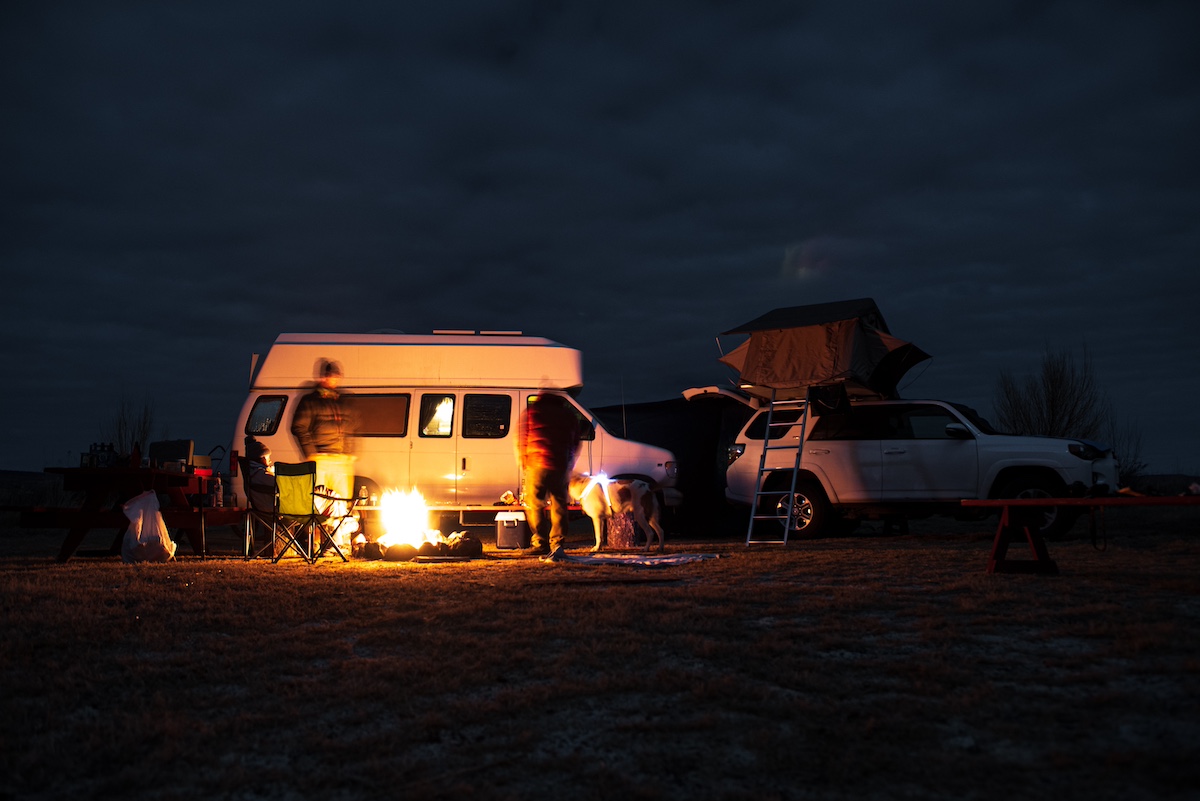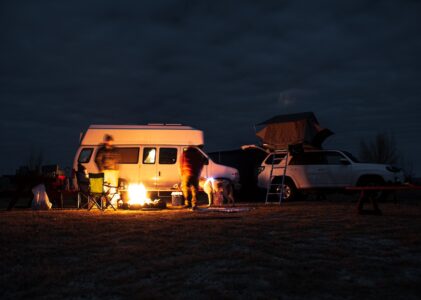Are you craving an outdoor adventure, itching to get away from the hustle and bustle of city life, and yearning to connect with nature? If so, camping or RVing might be the perfect escape for you. But before you hit the road or pitch your tent, you need to know how to find the perfect campsites and RV parks for a memorable experience. In this guide, we’ll walk you through ten proven tips to help you discover the perfect spots for your outdoor getaway.
1. Start with Online Resources to find the Perfect Campsites
In the digital age, finding campsites and RV parks has never been easier. Numerous websites and apps cater specifically to outdoor enthusiasts, making it a breeze to locate suitable places to stay. Here are some top online resources to kickstart your search:
- Recreation.gov: This comprehensive website covers federal recreation areas in the United States, including national parks and forests. You can search for campgrounds, RV sites, and even book your reservations online.
- Campendium: Campendium is a community-driven platform that provides detailed reviews and ratings of campsites and RV parks across North America. It’s an invaluable resource for real-time information from fellow campers.
- The Dyrt: The Dyrt is another camper-friendly website and app that offers user-generated reviews and photos. It’s an excellent tool for finding hidden gems and avoiding overcrowded spots.
2. Determine Your Camping Style
Before embarking on your camping or RV adventure, consider what type of experience you’re looking for. Do you prefer rustic, off-grid camping, or do you want the convenience of full hook-ups and amenities? Knowing your camping style will help narrow down your search:
- Primitive Camping: If you’re a minimalist and enjoy backcountry camping, look for remote campsites in national forests or Bureau of Land Management (BLM) areas. Websites like Freecampsites.net can guide you to free and primitive camping locations.
- Campgrounds: For a more structured experience, state parks, national parks, and private campgrounds offer designated campsites with varying levels of amenities. Research individual parks to find the ones that match your preferences.
- RV Parks: If you’re traveling in an RV, RV parks with full hook-ups (water, electricity, and sewer) can provide a comfortable and convenient stay. Use resources like RV Park Reviews to read about and select RV parks that suit your needs.
3. Plan Your Trip Well in Advance
Camping and RVing have gained immense popularity in recent years, and prime spots can get booked up quickly, especially during peak seasons. To secure the best campsites, plan your trip well in advance:
- Make Reservations: Once you’ve identified your destination, make reservations as early as possible. Many campgrounds and RV parks allow reservations up to six months in advance.
- Be Flexible with Dates: If your travel dates are flexible, consider camping during weekdays or in the shoulder seasons to avoid crowds and increase your chances of finding availability.
- Check Cancellation Policies: Life can be unpredictable. Check the cancellation policies of your chosen campgrounds or RV parks to understand the options available if your plans change.
4. Leverage Social Media and Forums
Social media platforms and online forums are goldmines of information when it comes to camping and RVing. Joining relevant groups and communities can connect you with seasoned campers who can offer valuable insights and recommendations:
- Facebook Groups: Search for camping or RV-related groups on Facebook. These groups often share real-time updates, reviews, and tips for specific regions or campgrounds.
- Reddit: Reddit has various subreddits dedicated to camping, such as r/camping and r/GoRVing. It’s an excellent platform for asking questions and seeking advice from experienced campers.
- Online Forums: Websites like IRV2 and Campfire Forums host discussions about RVing and camping, making it easy to find answers to your queries.
5. Consult Official Park Websites
When planning a camping trip to a national or state park, always check the official park website. These websites provide detailed information about camping options, fees, regulations, and any alerts or closures that might affect your visit. Here are a few key considerations:
- Park Fees: Understand the park entrance fees, camping fees, and any additional costs associated with your stay.
- Campground Amenities: Official park websites typically list the amenities available at each campground, including the number of campsites, restroom facilities, and accessibility for RVs.
- Trail Maps and Activities: Find information on hiking trails, recreational activities, and points of interest within the park.
- Operating Seasons: Some campgrounds have limited operating seasons due to weather conditions. Ensure the campground is open during your planned visit.
6. Use Navigation Apps and GPS Devices
Getting lost in the wilderness is an adventure in itself, but it’s not always the ideal scenario. To reach your campsite or RV park hassle-free, use navigation apps and GPS devices tailored for outdoor enthusiasts:
- Google Maps: While widely used for everyday navigation, Google Maps also provides information on campgrounds and RV parks. You can search for specific locations and read user reviews.
- RV GPS Units: Invest in a GPS unit designed for RVers. These devices consider factors such as height, weight, and length restrictions to guide you safely to RV-friendly routes and campsites.
- AllTrails: For campers who love hiking, AllTrails is an excellent app that offers detailed trail maps and reviews, ensuring you reach your favorite hiking destinations with ease.
7. Explore Campground Memberships
If you’re a frequent camper or RV traveler, campground memberships can provide significant savings and exclusive access to campgrounds and RV parks:
- Good Sam Club: The Good Sam Club offers discounts at thousands of campgrounds across the United States and Canada. Membership also includes roadside assistance and a camping savings guide.
- Thousand Trails: This membership program provides access to a network of campgrounds in the United States, offering a variety of camping experiences. Choose the membership that suits your travel preferences.
- KOA Value Kard Rewards: Kampgrounds of America (KOA) offers a loyalty program that provides discounts and rewards at their campgrounds nationwide.
8. Read Reviews and Ratings
Before making a reservation, take the time to read reviews and ratings from fellow campers. These insights can help you make an informed decision and avoid any unpleasant surprises. Look for both online reviews and campground-specific ratings:
- Online Reviews: Websites like Campendium, TripAdvisor, and Yelp feature camper reviews with details about their experiences, including the cleanliness of facilities and the overall ambiance.
- Campground Ratings: Some campgrounds have their own rating systems, allowing campers to provide feedback on their stay. Pay attention to these ratings when considering a particular campground.
9. Be Mindful of Regulations and Leave No Trace
Responsible camping and RVing are essential to preserving the beauty of our natural landscapes. Familiarize yourself with the Leave No Trace principles and any specific regulations for the area you plan to visit:
- Leave No Trace: Follow the Leave No Trace principles, which include packing out all trash, staying on designated trails, and respecting wildlife. Leave nature as you found it for future generations to enjoy.
- Campfire Regulations: Many areas have fire regulations in place, especially during dry seasons. Learn about campfire restrictions and alternatives like camp stoves.
- Wildlife and Wildlife Habitats: Respect wildlife by keeping a safe distance and not feeding them. Be aware of seasonal wildlife closures in certain areas.
10. Stay Safe and Prepared
Safety should always be a top priority when camping or RVing. Here are some essential safety tips to keep in mind:
- Emergency Contacts: Carry a list of emergency contacts, including local authorities, campground management, and roadside assistance services.
- First Aid Kit: Pack a well-stocked first aid kit and familiarize yourself with its contents. Be prepared for common outdoor injuries.
- Weather Conditions: Check the weather forecast for your camping destination and be prepared for changes in weather conditions.
- Communication: Ensure you have a reliable means of communication, such as a fully charged cell phone or a satellite phone in remote areas.
Finding the Perfect Campsites
By following these ten proven tips, you’ll be well on your way to finding the perfect campsites and RV parks for your next outdoor adventure. Remember that each camping experience is unique, so embrace the journey and create lasting memories in the great outdoors. Happy camping!

